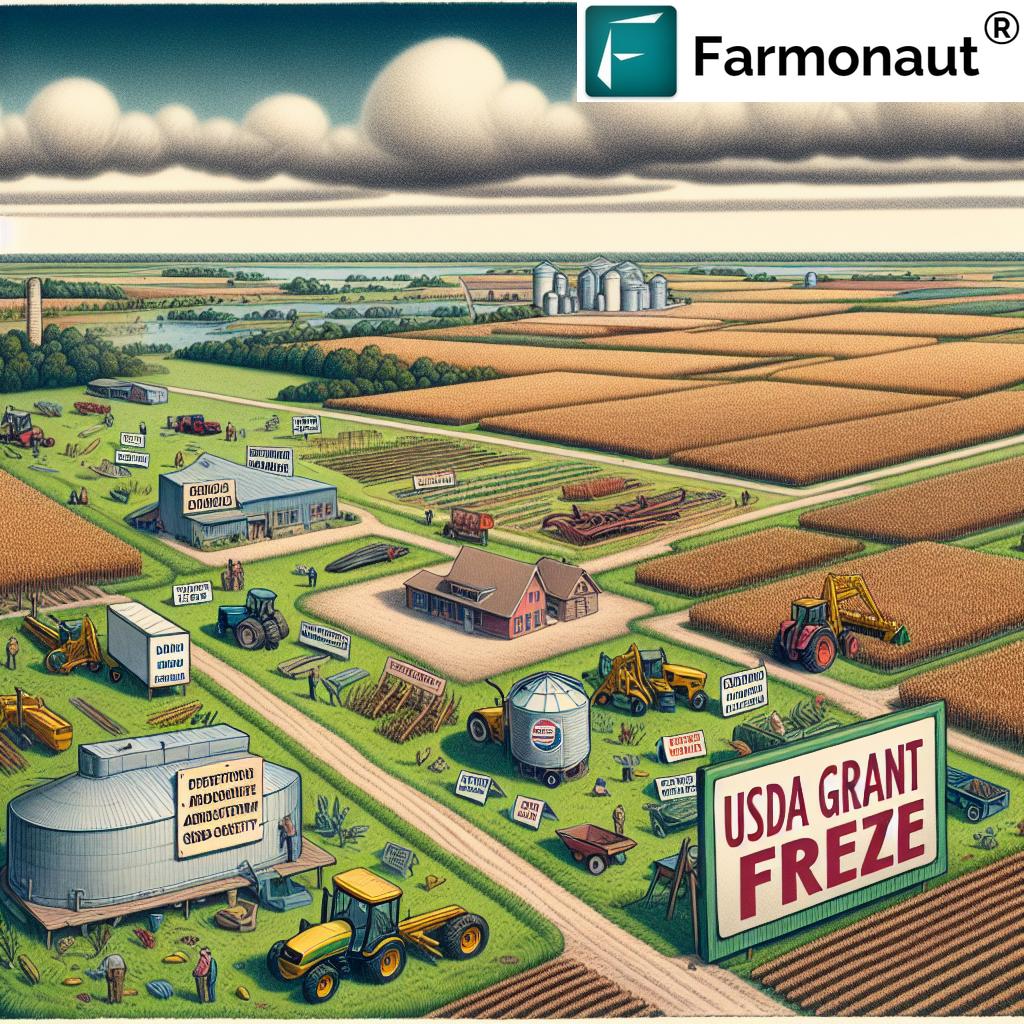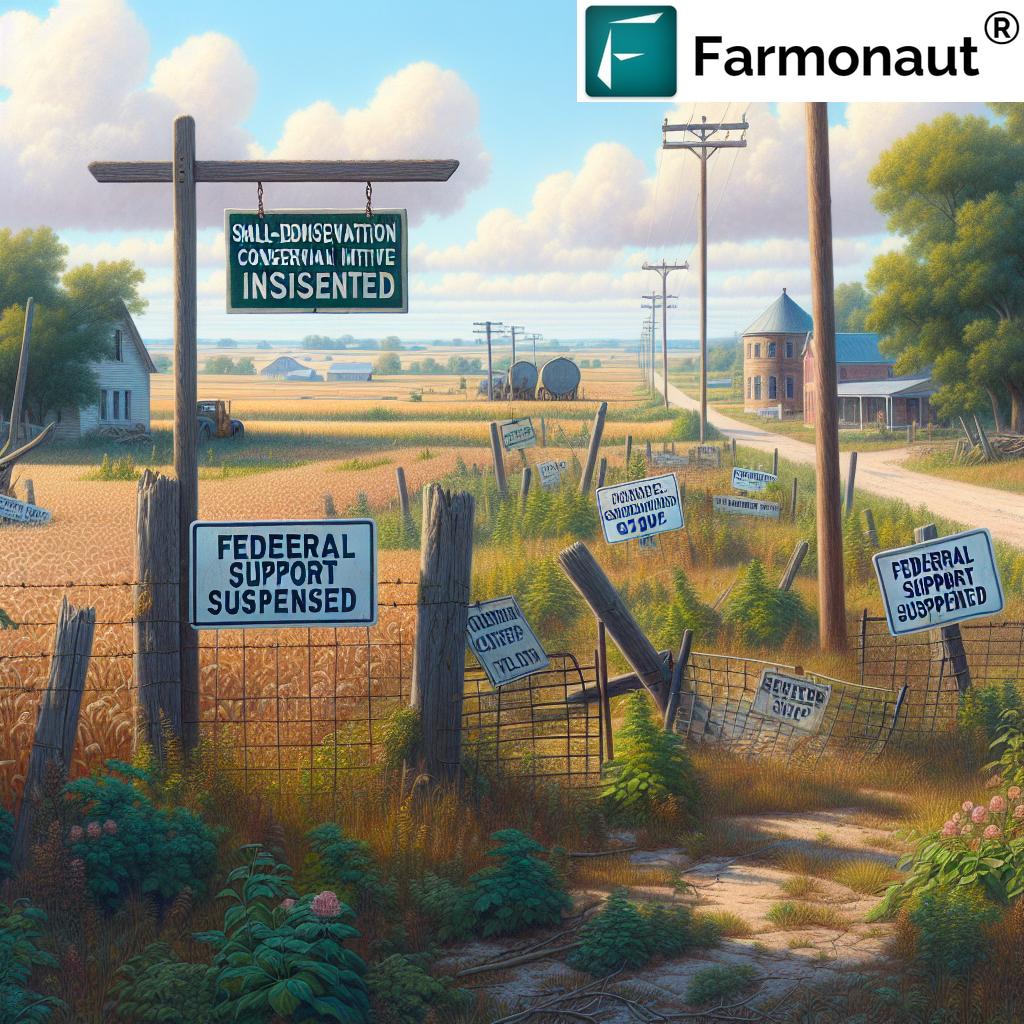USDA Grant Freeze Impacts Illinois Farmers: 5 Urgent Effects
Background of the USDA Grant Freeze
In early 2025, the U.S. Department of Agriculture (USDA) implemented a sweeping usda grant freeze affecting multiple grant programs nationwide, with a significant impact on Illinois farmers funding and agricultural communities. Initiated under the Trump administration as part of a federal review, the freeze suspended pivotal support mechanisms for farmers, local food systems, and rural economic stability. The programs directly impacted include:
- Environmental Quality Incentive Program (EQIP)
- Conservation Stewardship Program (CSP)
- Agricultural Conservation Easement Program (ACEP)
- Local Food Purchase Assistance Program (LFPA)
- Resilient Food Systems Infrastructure Program (RFSI)
- Rural Energy for America Program (REAP)
All these programs are fundamental to Illinois’s agricultural landscape, supporting conservation efforts, funding for food distribution, investments in local infrastructure, farmers’ financial stability, and furthering rural community resilience. The abrupt halt in grants and funds has sent shockwaves through the farming sector, highlighting the critical role federal government support plays in sustaining state and local agricultural economies.
5 Urgent Effects of the USDA Grant Freeze on Illinois Farmers
1. Financial Uncertainty for Illinois Farmers
The usda grant freeze has resulted in immediate financial turmoil, specifically jeopardizing Illinois farmers funding and the security of grants that were instrumental for operational stability.
- Local Food Purchase Assistance (LFPA) Freeze: Distribution halted, affecting 883 Illinois community sites and 176 local growers. Notably, 58% were new farmers, often most dependent on federal support for sustainability.
- Unpaid Funds: Of the $43M approved for Illinois under LFPA, $17.8M remains unpaid, leading to severe cash flow issues across local farms.
- Impact on Revenue Streams: Without anticipated usda grant funds, farmers can neither invest in current agricultural projects nor plan for future infrastructure.
These disruptions force farmers to reassess sowing schedules, resource investments, and hiring. In many cases, essential purchases for seed, fertilizer, and equipment upgrades have stalled, threatening the market presence of Illinois-grown products, especially for those supplying regionally produced foods.
How This Affects New and Small Producers
- First-generation and younger farmers face the highest risk as they lack deep reserves. The usda grant freeze intensifies competition for alternative financial support within the state and private lenders.
- Suspension of anticipated revenue disrupts financial planning, hinders the ability to service loans, and reduces eligibility for other financing (as grants often serve as loan collateral or evidence of stability).
2. Disruption of Local Food Systems & Food Banks
The usda grant freeze and agricultural grants suspended through the LFPA and RFSI programs have rocked the local food system resilience Illinois has established in recent years.
- Stopped Distribution: Food delivery to community sites — vital for reducing food insecurity in Illinois — was abruptly interrupted.
- Food Bank Impact: The Northern Illinois Food Bank, a key state player, faces $165,000 in un-reimbursed expenses, with more than $3.1 billion worth of food distributed through “Illinois EATS” now in jeopardy. (Source: CBS News)
- Support for New Revenue Streams: RFSI, designed to enhance supply chain capacity, was expected to inject $6.4M into new food infrastructure grants. Its sudden halt froze progress on cold-storage, transportation, and market access for regional producers and growers.
The consequences for communities relying on food aid have worsened food insecurity in Illinois — with disruptions impacting both urban and rural areas. Moreover, small and midsize businesses aiming to supply locally produced foods now lack immediate support or pathways to develop new opportunities or revenue streams.
3. Conservation Program Funding Cuts
Program freezes have cut federal support for agriculture conservation efforts at a critical time for both environmental quality and farm sustainability:
- EQIP, CSP, and ACEP Impact: The Environmental Quality Incentive Program (EQIP), Conservation Stewardship Program (CSP), and Agricultural Conservation Easement Program (ACEP) all faced suspended funding and new-agreement halts across Illinois.
- Operational Uncertainty: Projects to improve soil quality, enhance wildlife habitats, restore wetlands, and reduce emissions are now stalled or canceled, undermining progress toward regional and national environmental targets.
- Missed Financial Opportunities: Illinois farms counting on conservation-related grants and carbon credits are unable to initiate or complete planned improvements.
Such conservation program funding cuts disproportionately affect farms committed to regenerative agriculture and rural environmental stewardship. Lost momentum may take several seasons — or longer — to recover as initiatives are deferred or permanently abandoned.
4. Rural Economic Impact & Business Stability Risks
A key pillar of rural economic development, the usda grant freeze has hit energy-saving projects, farm infrastructure upgrades, and agribusiness innovation:
- REAP (Rural Energy for America Program): Multiple Illinois small businesses and farms had already secured grant awards and begun construction or purchased equipment based on promised funds.
- Immediate Economic Costs: With some recipients signing legally binding contracts, the suspension meant they are out-of-pocket — with no clarity on reimbursement or fulfillment from the federal government. Many are left with completed or in-progress projects and unpaid bills.
- Long-Term Impacts: This situation undercuts rural economic resilience, making both farms and supporting local businesses (mechanics, transport companies, storage facilities) vulnerable to layoffs. Ongoing losses may prompt permanent closures and a loss in rural Illinois job opportunities and community stability.
The impact on local food systems is compounded as producers lose critical support for renewable energy installations and infrastructure, further eroding their competitiveness and sustainability.
Wider Community Impact
- Investments in new cold-storage, packaging facilities, or distribution fleets, weighed down by the funding freeze, create downstream disruptions for all market players — from seed suppliers to retail grocers and regional food hubs.
- As farm revenue contracts, so do purchases from local shops and service providers, amplifying the economic blow at the community level.
5. Legal Actions & Instability in Federal Agricultural Grants
Amid mounting pressures, stakeholders are pursuing legal actions against the Trump administration, seeking the unfrozen disbursement of usda grant funds and support for crucial infrastructure and conservation projects:
- Non-Profits and Farmers’ Lawsuits: Legal complaints now challenge what plaintiffs allege is the unlawful withholding of IRA (Inflation Reduction Act) funded grants. These suits argue that the freeze has already brought financial losses and job cuts across Illinois farms and agricultural initiatives.
- Uncertainty Remains: Despite assurances that some withheld funds will be released, communication from the USDA remains inconsistent. The impact on Illinois farmers funding is lasting, as planning for planting, hiring, and marketing remains stuck in limbo.
The current federal support for agriculture is thus mired in uncertainty, leaving local communities, food systems, and conservation projects in a state of flux.
Summary Table of Key Impacts by Sector
| Sector | Estimated Financial Impact (USD) | # Affected Farms | Immediate Effect | Potential Long-Term Consequence |
|---|---|---|---|---|
| Crop Farming | $17.8M unpaid grants | ~1,200 | Suspended payments, delayed planting, resource shortfalls | Lower yields, loss of market share, farm closures |
| Local Food Systems | $6.4M delayed infrastructure | ~176 | Halted food distribution, strained food banks | Rising food insecurity, network disruption |
| Conservation | $4M+ suspended | ~350 | Paused/abandoned land restoration and stewardship projects | Degraded soils, failed conservation goals |
| Rural Businesses | $3M+ at risk | ~400 | Energy project stalls, contractor debts, layoffs | Business closures, reduced innovation, job loss |
| Community Food Banks | $165K+ un-reimbursed | N/A (network scale) | Reduced supply of fresh produce for needy families | Longer-term hunger, loss of local food system resilience |
State Solutions for Farmers & Local Food System Resilience
With the federal government’s agricultural grants suspended, Illinois lawmakers have moved swiftly to develop state solutions for farmers, address urgent needs, and reinforce local food system resilience.
- Local Purchasing Funds: Proposed legislation would reallocate state monies directly for procurement of farm food produced by Illinois growers, keeping revenue streams circulating within the state.
- Poultry Market Expansion: Initiatives to support Illinois poultry farmers in accessing new consumer markets seek to offset hits from suspended federal subsidies.
- Short-Term Relief Funds: Emergency state grants and low-interest loans are being considered to bridge funding delays for critical suppliers and distribution centers in the local food supply chain.
- Priority for Resilience: Rather than allowing farm closures and community food shortages, Illinois is focused on rebuilding buffers, strengthening infrastructure, and supporting regionally produced foods.
These measures highlight a growing demand for redundancy in the food supply chain and a recognition that federal support — while vital — must be supplemented by agile, local actions to safeguard food security and rural prosperity.
How Farmonaut Supports Agricultural Resilience in Changing Funding Climates
As Illinois navigates the aftershocks of the usda grant freeze, precision agriculture technologies can empower farmers and support local food system resilience, particularly when traditional funding sources are uncertain. At Farmonaut, our mission is to harness satellite monitoring, advanced AI, and blockchain to deliver actionable insights, help farmers optimize costs, and strengthen operational stability even during funding crises.
Farmonaut: Making Smart Farming Accessible in Illinois
- Satellite-Based Crop Health Monitoring: Our platform provides real-time crop health imagery (NDVI), moisture data, and pest alerts—enabling farmers to stretch every dollar and maximize yield from limited resources. Learn more about our Large Scale Farm Management Platform.
- AI-Driven Advisory (Jeevn AI): Timely agronomic advice, customized for local Illinois crop types and weather, helps growers make smarter decisions under financial pressure.
- Blockchain Product Traceability: Our traceability solutions allow Illinois farms and food businesses to verify the origin and journey of regionally produced foods—building consumer trust and supporting premium market positions even when federal support is in flux.
- Fleet & Resource Management: Efficient logistics and reduced wastage are vital with funding disruptions. See more about our Fleet Management Tools.
- Carbon Footprinting & Conservation: Our carbon tracking features let you prove, monitor, and enhance your environmental stewardship—critical for farms seeking future-state or private sustainability incentives even as federal conservation funds are delayed.
- Crop Loan & Insurance: Through satellite-verified reports, we help keep Illinois farmers eligible for loans and insurance claims, which is especially important as federal funds lag. Check out our Crop Loan & Insurance Solutions.
-
API Integration: Farmonaut’s data streams are available for integration via Farmonaut’s API. Developers and agribusinesses can automate monitoring, compliance, and advisory tasks—scaling sustainability across the Illinois region.
Explore API Developer Docs
Frequently Asked Questions: USDA Grant Freeze & Illinois Agriculture
-
What immediate support is available to Illinois farmers affected by the USDA grant freeze?
Currently, emergency state relief funds and short-term loans are being considered. Some local associations are coordinating group purchasing and market access to help buffer cashflow shortages for farms and food businesses. -
How does the USDA grant freeze affect food insecurity in Illinois?
The disruption halts food bank deliveries and reduces the supply of fresh, local produce to low-income households. This aggravates food insecurity, especially in regions historically reliant on community distribution networks. -
Which USDA programs are included in the funding pause?
Programs most affected include EQIP, CSP, ACEP, LFPA, RFSI, and REAP—all vital to crop, conservation, local food, and rural business sectors. -
Are there legal actions ongoing to lift the freeze?
Yes, several lawsuits have been filed by farmer groups and NGOs demanding that the federal government release withheld grants, especially those funded by the Inflation Reduction Act (IRA). -
How can Farmonaut help during funding interruptions?
Farmonaut delivers cost-efficient monitoring, advisory, and resource management tools that help Illinois farmers utilize existing resources to the greatest extent, optimize yields, and increase eligibility for third-party or future grants and financing. -
Where do I find more information about Farmonaut technology for Illinois agriculture?
Visit our platform or explore the Agro Admin App for large-scale management and other specialized technology solutions.
Conclusion: The Path Forward for Illinois Agriculture
The USDA grant freeze highlights the intricate ties between federal support for agriculture, local economic health, and food security. While the impact on local food systems, conservation, and rural economies has been severe, community and state-led initiatives are working to bridge gaps and protect Illinois’s agricultural assets.
At Farmonaut, we believe resilient agriculture is possible through technology-backed decisions, efficiency, and transparency. We encourage Illinois growers, businesses, and policymakers to combine data-driven management with local networks to future-proof farming operations—no matter the funding environment.
To learn how we can help you adapt, reduce costs, and build new opportunities and revenue streams in your region, visit our Farmonaut platform today.
The road to resilience starts with actionable insights, smart management, and strong local alliances—ensuring every acre and every farmer in Illinois can thrive even amidst shifting federal landscapes.
















